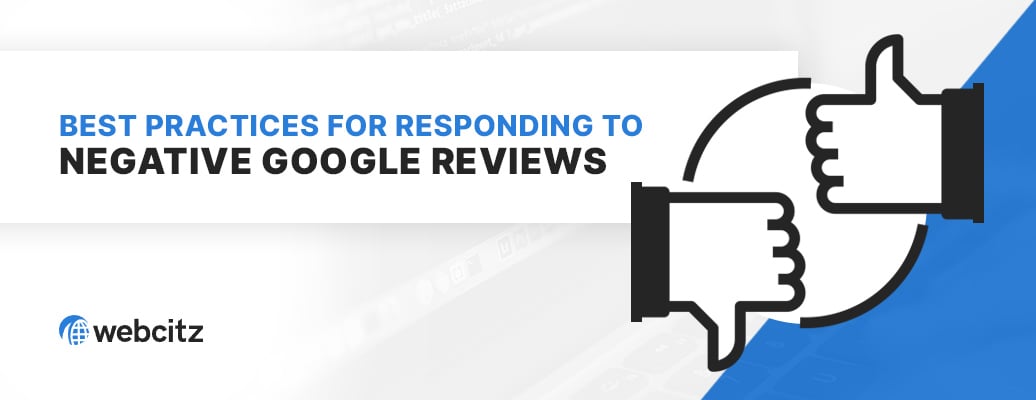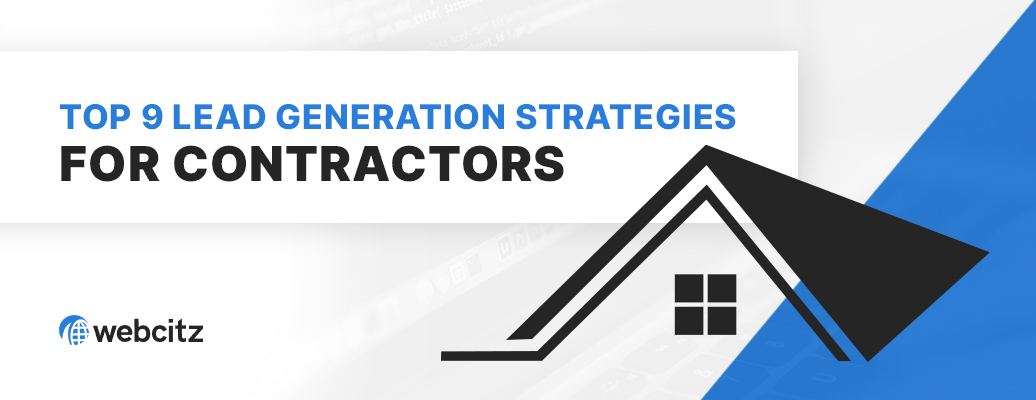Our Digital Marketing Services
We are a team of internet marketing specialists with diverse knowledge and experience in the latest internet marketing trends.
Take advantage of our experience, across 100+ business industries, to help drive traffic and improve conversions across your digital assets.
- 1.) SEO Strategies
- 2.) Link Building Campaigns
- 3.) Online Reputation Management Services (ORM)
- 4.) Content Marketing Strategies
- 5.) Social Media Advertising Services
- 6.) Search Engine Marketing Services
- 7.) Sales Funnel Development
- 8.) Conversion Rate Optimization (CRO)
- 9.) Email Marketing Services
- 10.) Lead Generation Strategies
- 11.) Video Marketing and Production
1.) SEO Strategies
To bring your website to the first page of search results for competitive phrases, we take a holistic approach to SEO within your digital marketing campaign.
This means reviewing your technical, on-page, and off-page search engine optimization since all three aspects of SEO management work together to show the value of your website to search engines.
When we take on new digital marketing clients, we often find page speed, content quality, and backlink profile issues.
Each of these SEO problems can be resolved within a managed SEO campaign.
A Few of Our Experts





Let’s explore more about each of these types of SEO:
Technical SEO Services
Technical SEO includes factors such as page speed, site security, XML sitemaps, site architecture, structured data, and broken pages.
These impact how Google crawls and indexes your page content, and how visitors interact with your website. In some cases, migrating to a better web hosting service with an improved caching system can be enough to resolve page speed issues.
You typically need the assistance of a web developer to improve technical SEO issues, since they are often related to the platform or theme used on your website.
We have an internal team of web developers skilled in common platforms like WordPress and Shopify.
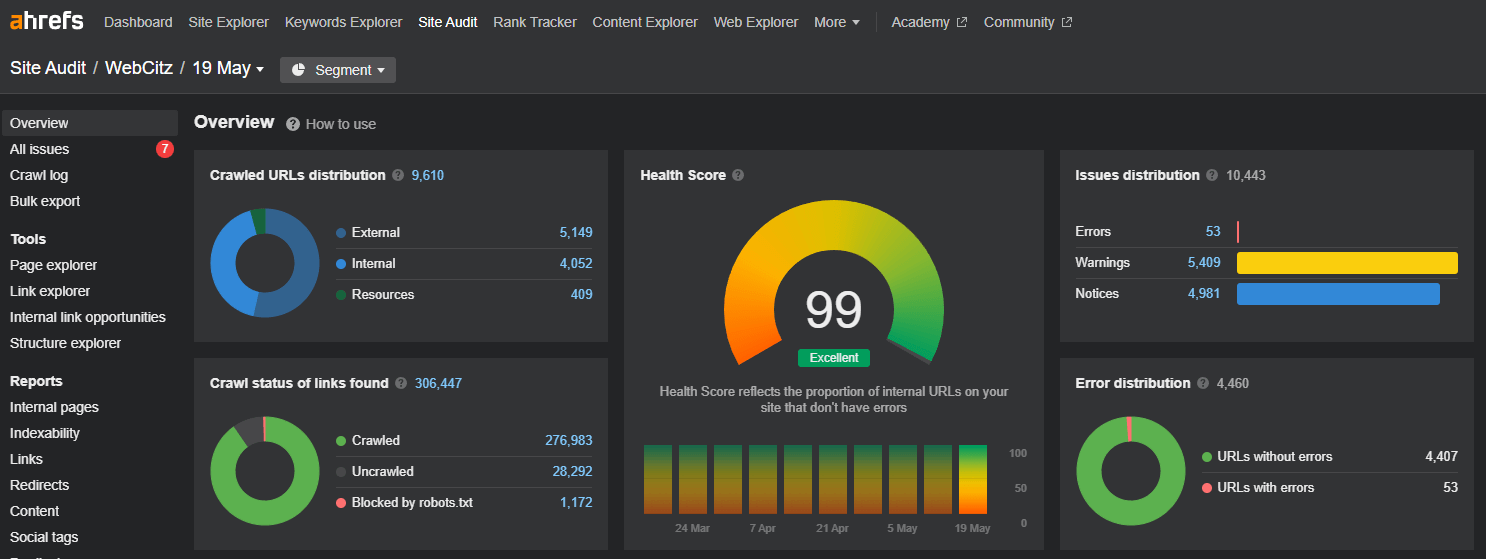
On-Page SEO Services
On-Page SEO includes factors such as content silos, content writing, internal linking, keyword research, competitive analysis, frequently asked questions, page titles, meta tags, Open Graph tags, images, and videos.
We can improve these areas of the on-page SEO to allow search engines to better understand the value of your page content and recognize you as an authority on the subject matter.
In addition, it will help increase important metrics like ” time on site” for your visitors, which shows search engines you provided something of value to the search user.
Never underestimate the value and importance of content within your online marketing strategy. It is used everywhere!
Off-Page SEO Services
Off-Page SEO is essentially the strength of your backlink profile, which is the number of referring domains pointing to your website, the naturalness of your anchor text and link velocity, the authority and relevance of your backlinks, signals from social media channels, and several other factors.
We can build natural backlinks to your web pages to help search engines understand your website is deemed worthy of third-party recognition.
The important takeaway is to understand you can’t focus on one or two areas of SEO in your digital strategy.
For example, if we design a professional website for you, but it lacks useful content or quality backlinks you will likely never see the first page of search results for competitive phrases.
In your digital marketing service, we can evenly distribute our attention to ensure competitors can’t bypass you by simply completing all the required SEO checklist items.
Mold Removal Contractor
Roofing Company
RV Rental
Ecommerce Website
2.) Link Building Campaigns
We’ve already briefly discussed the importance of building authoritative links in off-page SEO, but it’s worth mentioning again since people often don’t understand this area of search engine optimization.
When you look at the first page of search results for competitive keywords and long-tail phrases, you will almost always find large retailers in product-specific search results and long-standing service providers in local search results.
If you further review the exact pages of these search results you will often find the number of backlinks to those pages is far greater than your own relevant pages.
That is because search engines use backlinks as a ranking factor to determine how authoritative your website and content are on a particular subject.
To improve your own web pages, we can build quality backlinks to your homepage and other web pages using white-hat SEO link building services.
It is critical to see this as a long-term endeavor for your digital marketing strategy. We won’t get excited about this for a few weeks and build dozens of backlinks, then move on to something else for you for a few months.
We will establish a link-building strategy that will provide consistent and steady growth of quality backlinks from relevant websites and social media platforms.
Most of all, we need to keep your backlink profile natural by not overdoing exact-match phrases, not buying numerous backlinks from private block networks (PBNs), and not participating in any other black-hat link-building method.
We utilize a number of white-hat link building techniques in our digital marketing services, including:
- Utilizing the ” Skyscraper Technique” to build a bigger, better version of a ranked content article from a competitor.
- Writing in-depth articles to have featured on third-party websites as a guest post, which includes a link back to your website.
- Reaching out to high-authority websites to suggest content improvements to existing articles that may have become outdated, or didn’t cover a specific topic relevant to you.
- Responding to HARO requests from news reporters looking for expert opinions and feedback from people in your business industry.
- Adding your website to industry-specific directories by scanning competitors to see their most valuable business listings and NAP citations ( Name, Address, Phone).
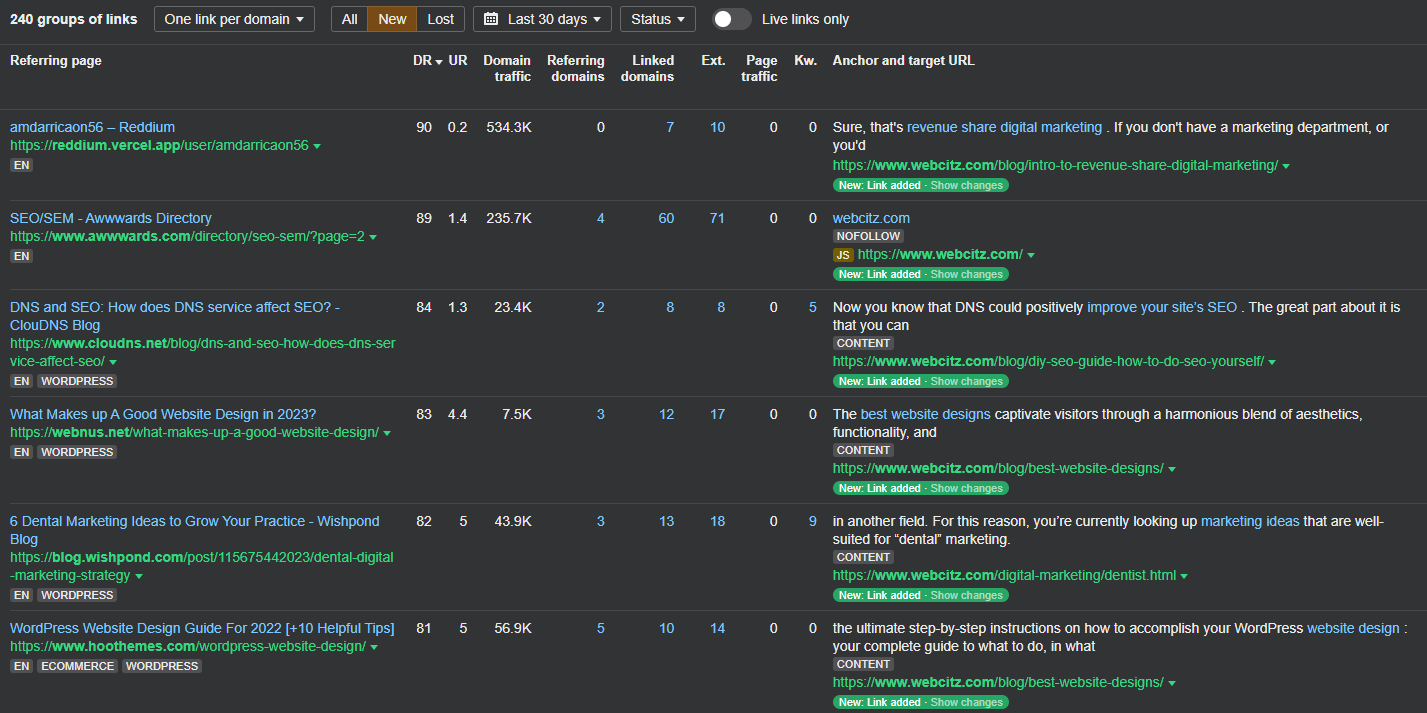
3.) Online Reputation Management Services (ORM)
Your online reputation is an important trust factor search engines use to determine rank positions, and your target audience uses it to make purchasing decisions.
This is true for all types of purchases and decision-making, ranging from the selection of a local service provider, the purchase of a product on an ecommerce store, and even the selection of a physician or attorney for a personal matter.
People love reading about the positive experiences, and sometimes even more about negative experiences, that others had with your product or brand.
For local service companies, we can help you develop a review generation program within your digital marketing services to increase the rate at which past customers leave reviews for your business.
This often involves collecting reviews on Google My Business, UpCity, Yellow Pages, Yelp, and other online review collection websites.
If you build an ecommerce website, we can help with the collection of product reviews and company reviews.
For an ecommerce business, it is important to collect reviews for both the quality of your products and the customer service experience of your storefront.
Online shoppers want to know the product they are purchasing is of sufficient quality or utility, but they also need to know you will be there to fulfill the order and answer questions after the sale.
For the reputation of professional service providers, such as doctors or attorneys, we can help establish protocols within your online marketing campaign for the collection of testimonials to ensure prospects always see a positive image of you.
This includes review generation, reputation monitoring, online reputation repair, survey campaigns, and social media growth.
In some cases, even SEO can be used to help curate the best possible first-page results for your online reputation.
The risk of ignoring your online reputation is the loss of long-term business, which often isn’t noticed until significant damage has been accumulated.
Let us take control of your online reputation today to ensure you always put forth a better image than your competition.
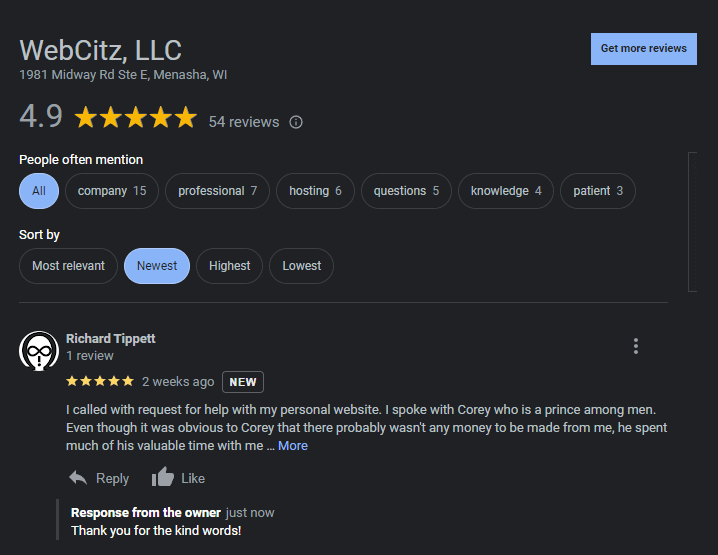
4.) Content Marketing Strategies
Most businesses use content marketing as a means of attracting, engaging, and retaining a high-interest audience by creating and sharing relevant blog articles, instructional videos, case studies, white papers, and other digital media.
This digital marketing approach helps establish your company as an industry thought leader, while also helping you dominate organic search results and the attention span of your target audience.
When your target customers begin to identify your brand as the source of valuable advice or guidance you will find it is easier to guide them through your sales funnel.
We help digital marketing clients put together the right content marketing plan for their business industry and goals.
It is important we identify your target audience before starting a content marketing plan.
This will help us understand the best media format for the content, whether that be informative blog posts, detailed case studies, informal whitepapers, best-in-class listicles, or drip email campaigns.
It will also help us determine the best delivery method, which might include social media, search results, or some other medium.
We often help implement content marketing tactics that involve blog content, infographic design, podcasts, videos, email campaigns, whitepapers, case studies, surveys, webinars, checklists, listicles, and lead magnets.
We particularly like using the case study method because it is a powerful tool for showing expertise as a digital marketing service provider.
These are all effective ways to market content if you implement them correctly within your business.

5.) Social Media Advertising Services
The use of social media ads in digital marketing involves paid ads being run on social platforms like Facebook, Twitter, TikTok, LinkedIn, and Instagram.
These social media channels offer a quick and effective method for connecting to your target audience by allowing you to select interests, behaviors, and demographics.
However, the downside can be the added cost of setting up the campaigns, creating landing pages, building out sales funnels, and performing conversion rate optimization to ensure the paid ads function as a proper lead generation or sales generation tool for your business.
Looking for ideas for your next set of digital ads? Check out our blog articles featuring our favorite Facebook Ads, favorite YouTube Ads, and favorite TikTok Ads for inspiration!
By leveraging the data sources of social media platforms, we can hyper-target your audiences to deliver personalized content based on demographics, behaviors, interests, and other factors.
While this is an enormous opportunity for most established companies, it can be an expensive lesson for businesses that aren’t ready to take full advantage of social media advertising.
We help small businesses and large corporations build out the necessary sales funnels and lead generation tools to make the most of their social media ads.
We also recommend putting in place plans for conversion optimization and retargeting within these digital marketing services, both of which will help improve the return on ad spend you see within your campaigns.
Let’s not forget to mention the freshness of your ad creatives.
When running a social media advertising campaign, we are mindful of ad decay and ad fatigue to prevent your campaigns from becoming stagnant and suffering from degraded performance.
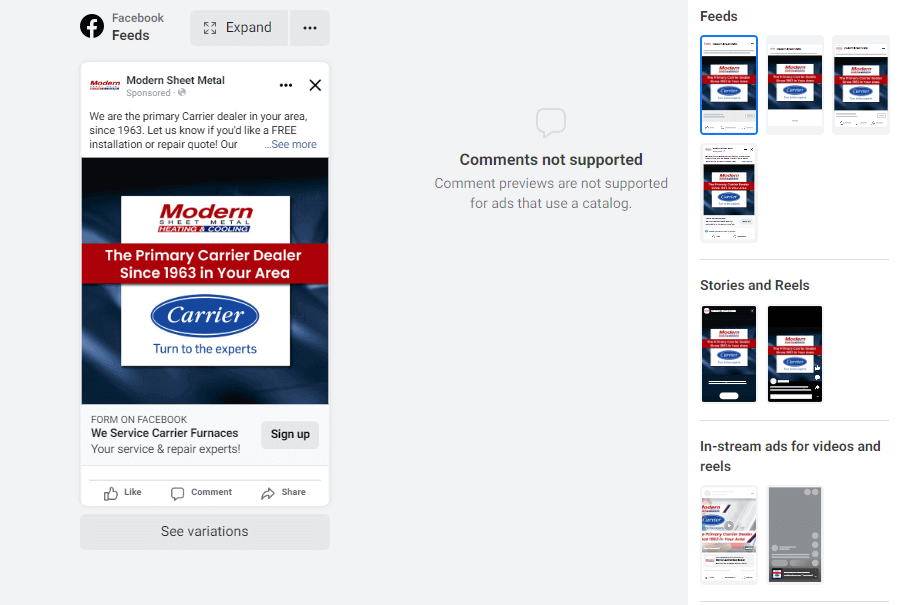
6.) Search Engine Marketing Services
The use of search engine marketing in digital marketing involves managing paid ads on search engines like Google and Bing.
We have found that Google Ads and Bing Ads offer a quick and effective method for connecting businesses to an engaged audience that is actively looking for your products or services.
The downside is the cost of setting up an effective and scalable paid advertising campaign, which often involves the creation of landing pages or sales funnels that are optimized for conversion opportunities.
We help businesses of all sizes build out the necessary landing pages and funnels in their digital marketing services to generate leads and grow revenue, which makes paid advertising a cost-effective digital marketing strategy.
For any search engine marketing campaign, we recommend creating a plan for retargeting and conversion rate optimization to improve your return on investment.
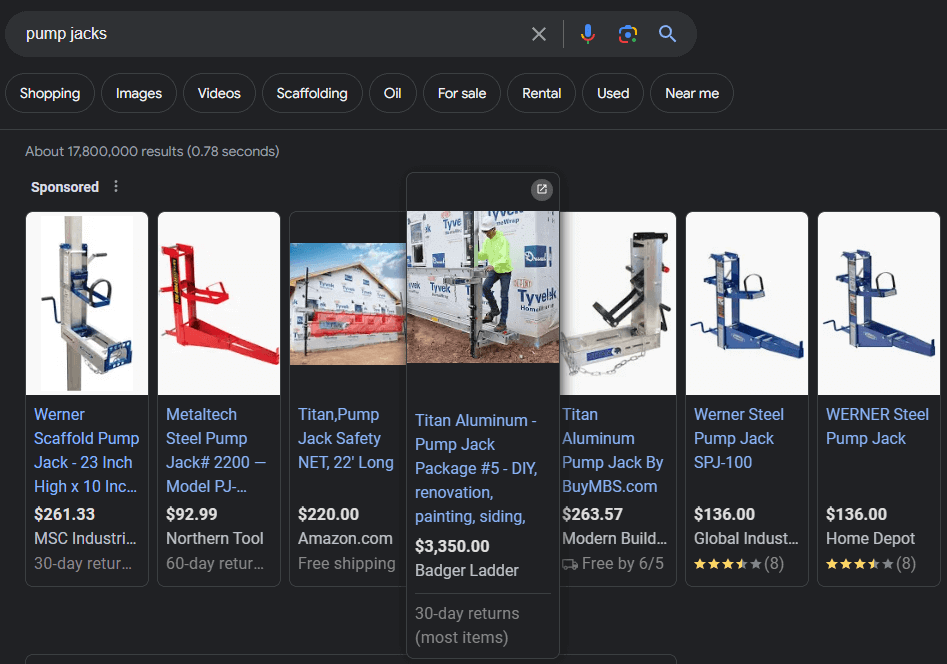
7.) Sales Funnel Development
A sales funnel, or purchase funnel, is the visual representation of your customer’s journey with your company.
The illustration of a sales funnel, which is often referred to as a marketing funnel or revenue funnel, looks just like a physical funnel you’d use to pour a liquid into a container.
The top of the funnel is always larger because it illustrates the large number of potential customers that might interact with your business. The funnel narrows at the bottom to represent the various exit points within the sales process.
Naturally, the bottom of the funnel is the smallest part because it represents the number of people who actually converted through the generation of a lead or the sale of a product.
The development of a sales funnel is more difficult than the explanation of its concepts.
For example, some of the most successful sales funnels produce millions of dollars of value each day for their businesses.
To make a sales funnel that produces value for your business, we have to put thought into the goal of the sales funnel and the type of sales funnel we want to implement for your business.
There are numerous types of sales funnels, including self-liquidating funnels, automated webinar funnels, lead magnet funnels, premium client funnels, free plus shipping funnels, affiliate sales funnels, and dozens of others to consider.
When you work with one of our digital marketing specialists, you will have an experienced digital marketer to bounce ideas off to help you determine the best type of revenue funnel for your business.
Alternatively, if you don’t have an interest in being involved in the process, we can research more about your business and industry to determine the best funnels to explore and test within your digital marketing solutions.
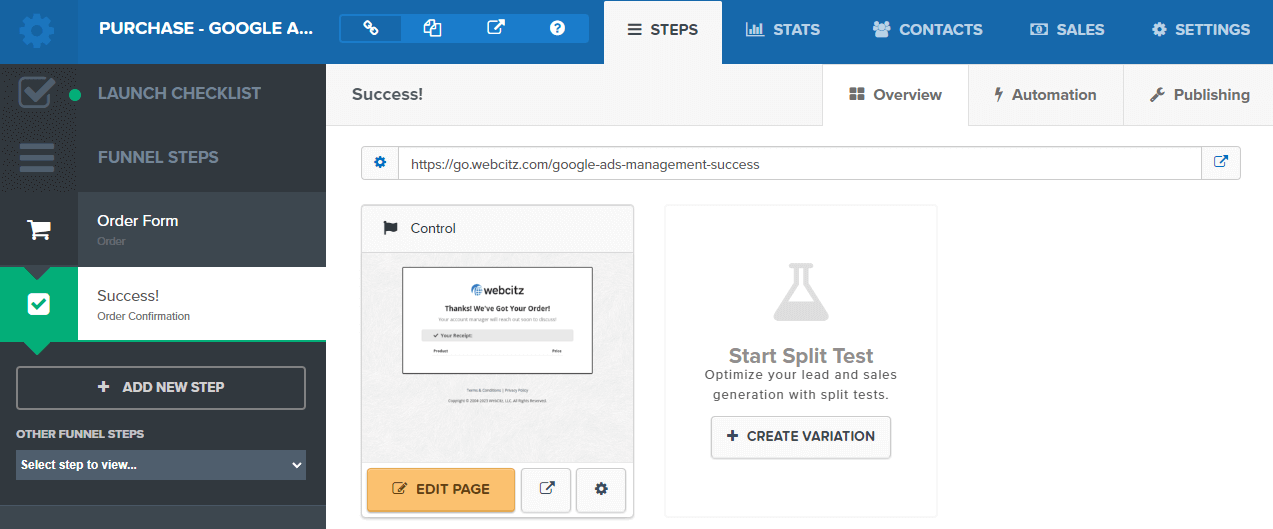
8.) Conversion Rate Optimization (CRO)
There is almost no reason to neglect conversion rate optimization within a digital marketing campaign.
This is a critical aspect of any type of online marketing service since it directly impacts the ability of the marketing service to provide value for the small business or large corporation paying for the marketing service.
Boosting conversion rates can have a huge impact on your bottom line.
Before we pursue a CRO strategy for your business, it is important you understand what it is, how it works, and how to evaluate the service.
This is a time-intensive process that involves plenty of iterative research and testing.
What makes it most challenging is the CRO strategies that work for one client might not work for another client, even when both businesses are in the same industry.
The most common CRO strategies include reducing form fields on contact forms, testing different call-to-action phrases, creating attractive headlines, implementing a sense of urgency, fixing mobile website issues, improving page speed, adding exit-intent popups, bringing CTAs above the fold, defining value for the visitor, and adding trust and social proof signals.
True conversion rate optimization can become much more complex.
To really dive into CRO, we have to fully understand your business offer, your competitors, the strengths and weaknesses of your value proposition, how visitors are currently interacting with your digital assets, your online reputation, and many other factors.
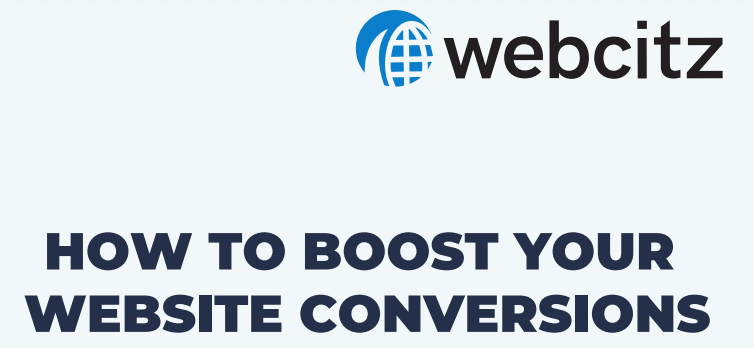
9.) Email Marketing Services
We can use email marketing within your digital strategy to increase brand awareness, generate website traffic, drive sales and revenue, bring awareness to your social media profiles, engage past customers, and gain valuable information about your target audience.
Most of our digital marketing clients use Mailchimp, ActiveCampaign, and Constant Contact for their email marketing campaigns.
These are robust email marketing tools to create subscriber lists, segment your audience, and even develop email marketing drip campaigns.
The most important part of email marketing is for us to develop a plan to increase your subscribers.
We help email marketing clients build and nurture their email marketing lists by implementing email collection opportunities through lead magnets, exit-intent popups, checkout processes, squeeze pages, referral programs, affiliate programs, and numerous other methods.
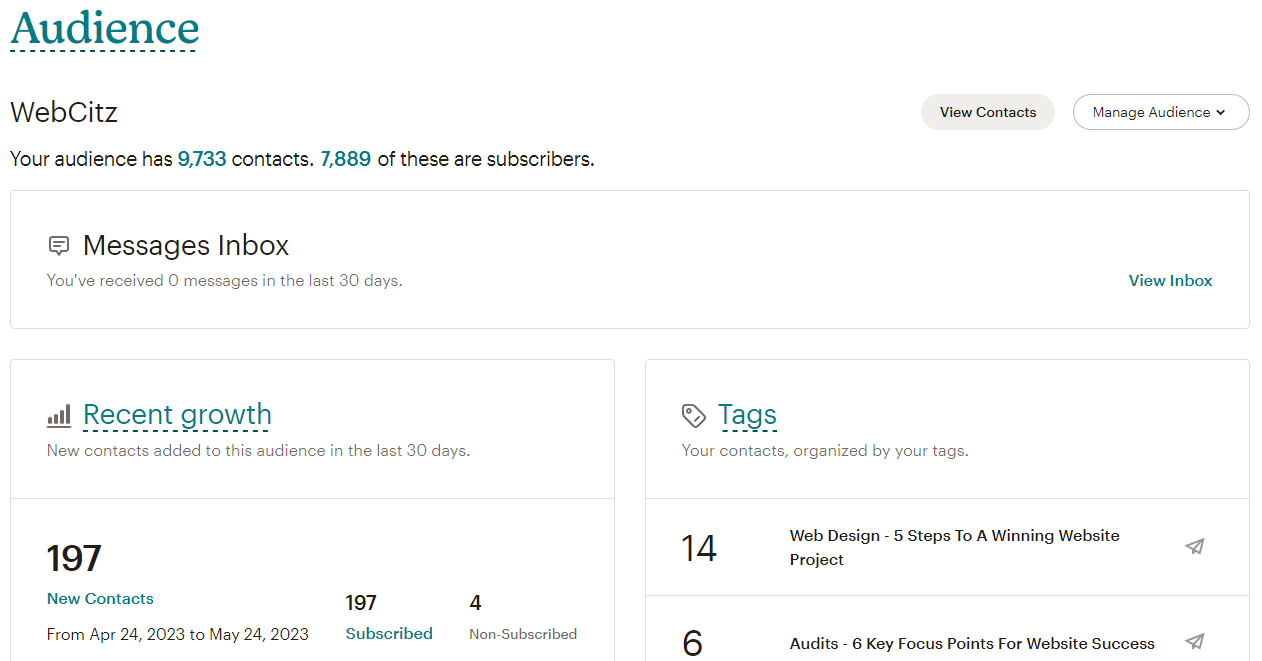
10.) Lead Generation Strategies
For local service providers, the most important part of an inbound marketing program is an effective lead generation strategy.
Not everything can be sold on the internet.
For a lot of products and services, a phone conversation or in-person conversation is needed to close the sale.
For these types of business industries, lead generation strategies within your digital marketing services are going to be critical.
There are many types of lead generation strategies we can consider for you, all of which have been tried and implemented by our digital marketing team at some point in the past.
The most common lead gen strategies include the creation and sharing of helpful content, retargeting past website visitors, nurturing past contacts with email marketing, engaging visitors with live chat, developing free tools for visitors to use, creating referral programs and affiliate programs, creating video content that can be shared online, and even setting up free webinars for visitors to attend.
For most successful digital marketing campaigns where lead generation is a primary goal, our team will develop and implement one or more lead gen strategies in your digital assets to test what works best for your business.
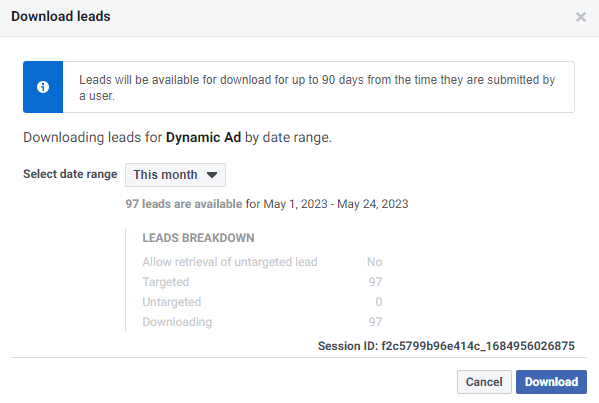
11.) Video Marketing and Production
As a full-service digital marketing firm, we have our own in-house video production and video marketing department.
This has been extremely helpful for content marketing methods that required creative video assets.
We’ve used our video production department for the creation of video ads on Facebook and Youtube.
There are many great applications for video production within your digital marketing strategy.
We can use videos to demonstrate unique products, teach new concepts, and improve visitor duration. We can also implement videos within your digital advertising campaigns to bring excitement to your campaigns.

Digital Marketing Services FAQs
What is digital marketing?
In a most simple definition, digital marketing (sometimes referred to as online marketing) is the process of advertising products or services online through channels like websites, search engines, social media, email, or mobile apps to prospective clients.
Most business owners think of online marketing as another phrase for search engine optimization or paid advertising. While both of those services are used in internet marketing, neither fully explains the depth of a modern online marketing program.
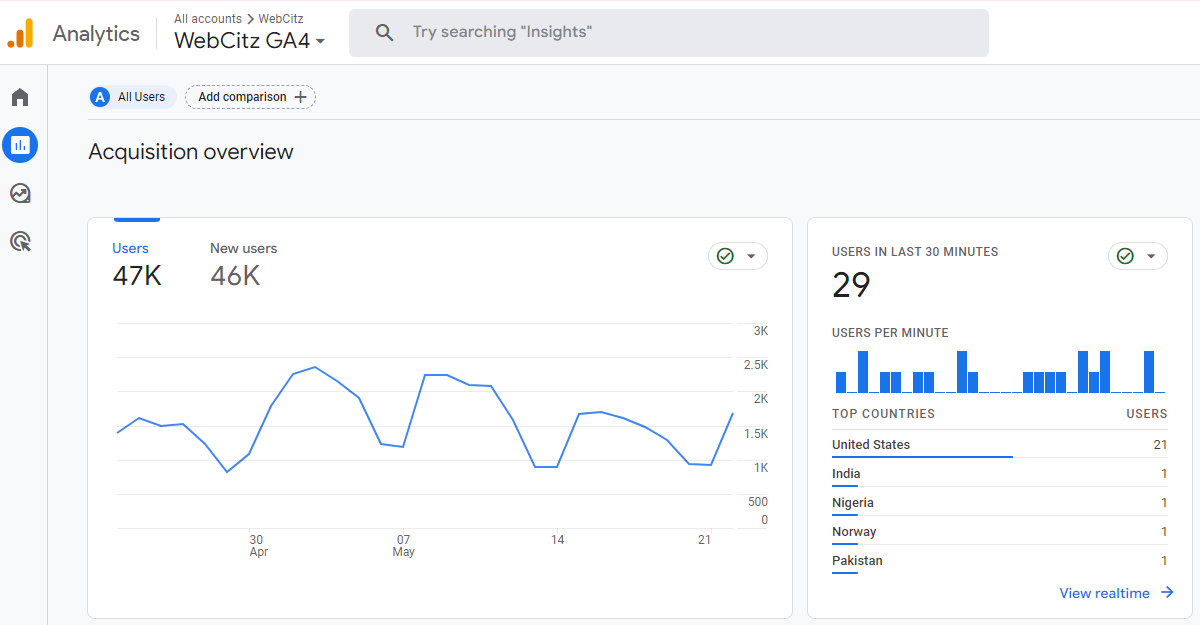
Today’s digital marketing campaigns often include dozens of internet marketing tactics, all working in tandem to help improve your visibility and conversions.
For example, the best digital marketing services will include tactics to:
- Drive traffic to your digital assets (websites, landing pages, sales funnels, etc) through SEO, social media marketing, affiliate marketing, or paid advertising.
- Increase revenue for your business through conversion rate optimization and user experience improvements.
- Track how visitors interact with your digital assets to help you better understand areas of improvement, retargeting opportunities, or pain points.
- Show expertise, authority, and trust through content marketing, video production, link building, review collection, social proof, and website improvements.
- Build and nurture relationships through email marketing and social media management.
Why should I invest in digital marketing?
If you manage a business that relies on selling a product or service, you will eventually need to consider some form of marketing to improve revenue.
There are many reasons to consider digital marketing services over other, more traditional, marketing strategies.
Let’s go over some of the great reasons to implement an online marketing strategy within your business:
- Digital marketing is often more affordable than other forms of marketing because it can be started at a low amount and scaled as success is measured.
- With the use of valuable reporting tools like Google Analytics, you can get better insights into how many visitors interacted with your brand, how long your marketing efforts kept their attention, and if you were able to bring them back to your website in the days, weeks, or months after their first interaction.
- Everyone is constantly on their phones, tablets, and desktop computers. Why not choose a marketing format and medium that is able to follow your target audience anywhere they go in life?
- The flexibility of digital advertising is far greater than print marketing, billboard ads, television ads, or radio commercials that can’t be updated as easily.
- Online marketing provides the best capacity for user engagement. Good luck getting people to comment, like, or share your non-digital advertisements.
How do I make a digital marketing plan?
Before we start your digital marketing campaign it is important to create a plan with measurable business goals.
We want to ensure everyone involved understands the goal of the digital marketing service to prevent spending time on ideas that won’t positively impact your business.
1.) Identify your target audience
With a clear set of business goals in place, we can move on to identifying a target audience.
It is important to understand who we are targeting. This helps us tailor our digital marketing efforts to platforms your audience engages in and that we use messaging that resonates with your target audience.
2.) Determine audience needs
Now that everyone understands your business goals and your target customer, we can make an informed decision regarding the needs and intent of your audience.
This will help ensure our focus on the right keywords for your digital marketing and align your content marketing strategies with the needs of your audience.
3.) Start slower moving services sooner
If we plan to incorporate search engine optimization, we will make that our first priority. The slowest moving digital marketing tactic is search engine optimization.
The improvements we make to your website, your content, and your backlinks can take weeks to months for search engines to fully recognize and have an impact on your rankings.
4.) Build out quality landing pages or funnels
This is a great time to consider paid advertising for your website or other digital assets. However, before sending paid traffic to your homepage, product page, or service page, we will discuss the creation of a landing page or sales funnel with you.
Most paid advertising campaigns that have high bounce rates and low conversion rates make the mistake of sending traffic to a page that isn’t optimized to convert a cold audience.
The best digital marketing tactics employ the use of squeeze pages and sales funnels to lead people to the desired marketing outcome.
5.) Create automated email sequences for retargeting
Now that plans are in place for bringing traffic to your website, we should consider how to best interact with those visitors after they leave your website.
Not everyone who visits your website, landing page, or sales funnel will convert on the first visit.
For that reason, we should consider options within your digital marketing services to build an email marketing list or set up tracking pixels to retarget recent visitors to your website.
6.) Plan for continuous testing
When all of these digital marketing strategies are in place, we are ready to enter the testing and optimization phase.
This involves constantly measuring the success of your campaigns, looking for areas of improvement, and even trying new ideas that you read about in case studies or white papers.
We should always be in a state of conversion rate optimization throughout all aspects of your digital marketing campaign.
What are sales funnels and why are they important?
A sales funnel is a structured approach to guiding potential customers through the buying process, from awareness to purchase. It helps businesses optimize each stage of the customer journey and increase the likelihood of conversion.
How can conversion rate optimization (CRO) improve my business?
CRO focuses on improving the effectiveness of your website or landing page in turning visitors into customers. By analyzing and refining the user experience, CRO can lead to more sales, sign-ups, or other desired actions without increasing traffic or ad spend.
What methods do you use for lead generation?
Lead generation strategies can include content marketing, email marketing, SEO, PPC, social media marketing, and more. The best methods depend on your business type, audience, and goals.
Is email marketing still effective?
Absolutely! While there are many communication platforms available, email marketing remains a powerful tool for building relationships, providing value, and driving conversions, especially when personalized and targeted effectively.
How do you measure the success of a digital marketing campaign?
Success is measured using various metrics, such as website traffic, conversion rate, click-through rate, return on investment (ROI), and customer acquisition cost. The specific metrics depend on the campaign goals.
Can I choose only one specific service, like PPC, or do I need a full digital marketing package?
You can certainly choose a single service based on your needs. However, many businesses benefit from a comprehensive approach that integrates multiple strategies to maximize results.
How long before I can see results from my digital marketing efforts?
The timeframe for results varies. For instance, PPC campaigns can show immediate results, whereas SEO typically requires a longer-term commitment to see significant ranking improvements.
Hear what our customers are saying













